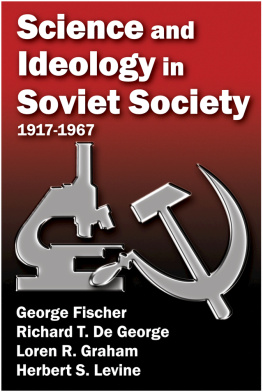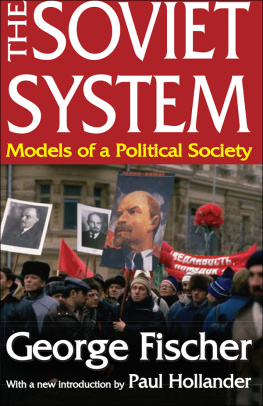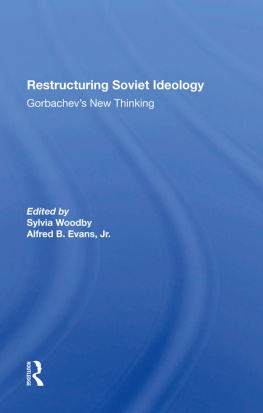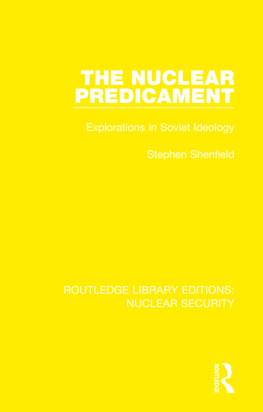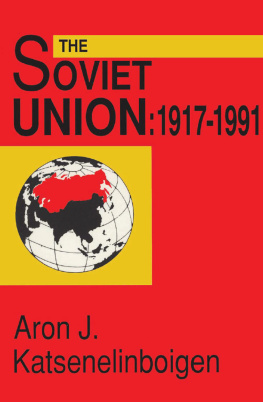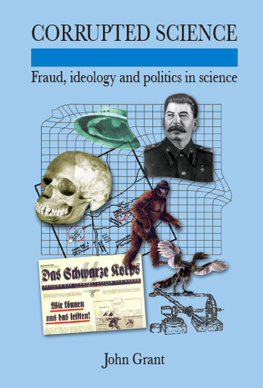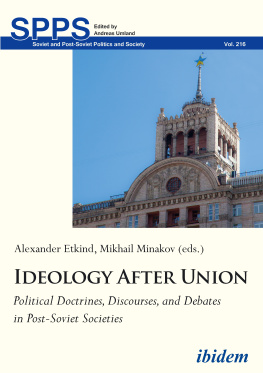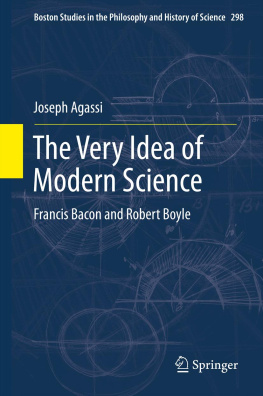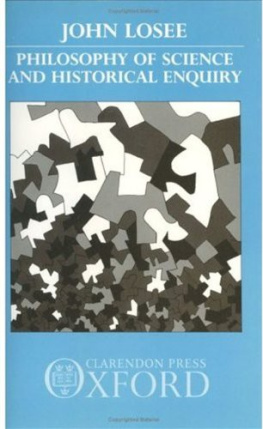Originally published in 1967 by Atherton Press.
Published 2012 by Transaction Publishers
Published 2017 by Routledge
2 Park Square, Milton Park, Abingdon, Oxon OX14 4RN
711 Third Avenue, New York, NY 10017, USA
Routledge is an imprint of the Taylor & Francis Group, an informa business
Copyright 1967 by the Trustees of Columbia University in the City of New York.
All rights reserved. No part of this book may be reprinted or reproduced or utilised in any form or by any electronic, mechanical, or other means, now known or hereafter invented, including photocopying and recording, or in any information storage or retrieval system, without permission in writing from the publishers.
Notice:
Product or corporate names may be trademarks or registered trademarks, and are used only for identification and explanation without intent to infringe.
Library of Congress Catalog Number: 2011035590
Library of Congress Cataloging-in-Publication Data
Science & ideology in Soviet society
Science and ideology in Soviet society: 1917-1967 / George Fischer ...
[et al.].
p. cm.
Originally published: New York: Atherton Press, 1967, with title Science
& ideology in Soviet society.
ISBN 978-1-4128-4594-6 (acid-free paper)
1. Learning and scholarship--Soviet Union--History. 2. Science--So
viet Union--History.3. Science--Political aspects--Soviet Union--History.
4. Science-Social aspects--Soviet Union--History. 5. Ideology--Soviet
Union--History. 6. Soviet Union--Intellectual life--1917-1970. 7. Soviet
Union--Politics and government--1917-1936. 8. Soviet Union--Politics
and government--1936-1953. 9. Soviet Union--Politics and government
-1953-1985. I. Fischer, George, 1923- II. Title.
AZ712.S3 2012
001.20947--dc23
2011035590
ISBN 13: 978-1-4128-4594-6 (pbk)
The Authors
GEORGE FISCHER, who is also the editor of this book, is an Associate Professor of Sociology at Columbia University and, concurrently, a staff member of the Russian Institute and the Bureau of Applied Social Research. Professor Fischer has held research appointments as a Junior Fellow of the Society of Fellows, Harvard University, as a Fellow of the Center for Advanced Study in the Behavioral Sciences, and as a Guggenheim Fellow. He has written five and edited three earlier books in sociology and history. His next book, The Soviet System and Modern Society, will also be published by Atherton Press.
RICHARD T. DE GEORGE was awarded his Ph.D. at Yale and is now Professor and Chairman of the Department of Philosophy at the University of Kansas. From 1965 to 1906 he was a Lecturer in Philosophy and a Senior Research Fellow at the Russian Institute of Columbia University. Professor De George has held Fulbright, Ford Foundation, and ACLS/SSRC fellowships. He has edited and contributed to several books, and is the author of Patterns of Soviet Thought .
LOREN R. GRAHAM is an Associate Professor and a staff member of the Russian Institute at Columbia University. Professor Graham began his career as a research engineer. Specializing in the history of science, he was awarded his Ph.D. in history at Columbia. He taught at Indiana University before returning to Columbia. He is the author of The Soviet Academy of Sciences and the Communist Party, 19271932.
HERBERT S. LEVINE is an Associate Professor at the University of Pennsylvania and was a visiting professor of economics at the Russian Institute from 1964 to 1966. While a research fellow at the Russian Research Center of Harvard University, Professor Levine completed a large-scale study of economic planning in Soviet industry. He has contributed extensively to economic journals and has served as Executive Secretary of the Association for the Study of Soviet-type Economies (ASTE).
Our era has been called the age of science but also the age of ideologies. Like most other societies today, the Soviet Union responds to the impact of both science and ideology, and there both elements loom especially large. What is the interaction of the two? Laymen as much as experts are apt to disagree sharply about, or be ignorant of, their mutual effect.
This volume seeks to shed some light on this important but difficult question. It focuses on the current Soviet scene: each of the four chapters is devoted to a different field of sciencesociology, philosophy, cybernetics, and economics. Recent developments have made all these fields of particular interest. Without claiming that these four areas are typical of all science or all fields of scholarship, the authors believe that the disciplines discussed are revealing of trends in Soviet science in general and of its interaction with an established (though not immutable) ideology in particular.
These essays grew out of a series of lectures at the Russian Institute of Columbia University delivered by four of the Institute's associates in 1966. The opening essay has been considerably revised and enlarged; this was done in part so as to provide some fuller introduction to the over-all problem of science and ideology. In its present version, then, it serves also as an introduction to the volume. The other essays, reworked by their authors, follow by and large the scope of the original lectures.
Each author deals with the interaction of science and ideology in a distinct way. The reader will find that, as he moves from the first essay to the last, the amount of attention explicitly paid to this problem diminishes. Instead, he will find increasing stress put on specialized issues within each field. This is especially true of the chapter on economics.
Nonetheless, there is a common theme running through the essays. While each author weighs and interprets the evidence quite distinctively, all lean toward one common view. They appear to agree that, in its present Soviet setting, the encounter of science with ideology need not always result in conflict. Specifically, they holdin varying degreesthat in the 1960s Soviet science (or at least the disciplines covered here) may in fact help to sustain the established system and its ideology rather than weaken or erode them.
Without necessarily considering this a lasting pattern, each author finds that in his own field the evidence fails to bear out the opposite view, so widely held in the West. In contrast with many writers and observers who speak of an endemic and ubiquitous conflict between science and Soviet ideology, the contributors to this volume point to some interesting elements of harmony or even mutual reinforcement.
The authors are most grateful to the four scholars who kindly agreed to chair the sessions at which the original lectures were given: Professors Daniel Bell, Robert K. Merton, and William S. Vickrey, of Columbia University, and Sir Isaiah Berlin, of Wolfson College, Oxford. By their comments they contributed a good deal to whatever value this book may have.
The authors also wish to record their debt and gratitude to three members of the Russian Institute staff: Alexander Dallin, director until 1967; Lyn Cannastra, administrative assistant; and Constance A, Bezer, editorial assistant. Over the past few years, they have added much to the authors' various associations with the Institute. As it marked its twentieth year, the Russian Institute itself made possible this new look at a thorny problem that in our time affects all societies.

